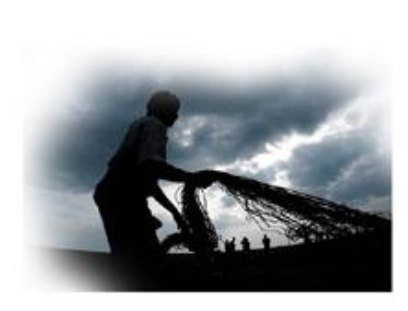|

Going
Once and Leaving Twice:
the
Net Worth of a Christian

“They left everything
and followed Him”
(Saint Luke 5.11)
The Biblical narrative
tells us that Simon Peter, James, and John, having been invited by Jesus
to become “Fishers of Men”, made no preparation whatever to follow Christ.
They left everything ... immediately.
Later, however, we find St. Peter and St. John fishing once again
in an episode almost identical with the first. 1
Each time St. Peter is fishing and each time he comes to recognize Christ
in the middle of his work. He was still simply a “Fisherman” on both
occasions — he had not yet become a “Fisher of Men.” Likewise, on both
occasions, St. Peter’s response in recognizing Christ is immediate:
the first time he throws down the net at once and leaves everything,
and the second time he leaps into the water since the boat cannot carry
him fast enough to Jesus.
Eventually St. Peter did indeed leave everything. He tells the man who
begs money of him,
“Silver and gold I have none; but what I have, I give thee: In the name
of Jesus Christ of Nazareth, arise, and walk.”
2
— and heals the man.
That was after St. Peter gave up on fish and went after bigger things.
We, too, are called to leave everything and follow Christ — and, like
St. Peter, to pursue greater things: the salvation of souls
.. even our own! Most of us are reluctant to do this, for we have little
faith.
It really is a matter of practice. Even now we should be
preparing to leave everything ... and, hopefully, to follow Christ
— at the hour of our death.
One thing is absolutely certain: sooner or later we will
leave everything. Even the most obdurate atheist knows this. Whether
we will leave it before we leave it — in other words, whether
we will choose to die to this world before die in this
world — die and leave we must, and will.
Like Peter the “Fisherman”, we are engaged in other things when Christ
comes along out of nowhere and calls us to follow Him. St. Peter did
not expect to encounter the Son of God while mending his nets. Neither
will we in the middle of a stock trade, while preparing dinner, or as
we pull up the covers for the night.
“The
Son of Man will come at an hour that you least expect.”
Do you doubt it? Ask St. Peter ... if you could ... or simply look at
today’s obituaries, which you can.
Duns Scotus, the great medieval philosopher, theologian, and Franciscan,
has engraved on his tombstone the following:
Semel sepultus, bis mortuus
... “buried once,
died twice”
Think on it
He died before he died — to the world, to the flesh, to the devil,
to his own willfulness and selfishness, to his vanity and to his pride.
The physical burial, in a sense was a formality. He was already living
in Christ — and while in the world, was not of
the world. Alike, he knew the City of Man and the City of God.
He also knew that he could not hold this dual citizenship indefinitely,
so he renounced the one altogether. Learning to die, he learned to live.
It is the quintessential paradox of which Christ spoke:
“he that will save his life, shall lose it: and he that shall lose his
life for My sake, shall find it”
3
You cannot rob
a holy man: His only possession is God
Death was no thief in the night to St.
Peter or Duns Scotus. Why? There was nothing to steal. They gave up
everything and followed Christ. Peter had no practice. He just dove
into it — at least once, quite literally.
For the rest of us, it would seem wise to bone up on it while we have
time, to practice leaving before we leave, and to renounce —
at least with our will — everything that cannot and will not accompany
our leaving to follow Jesus Christ. After all, our faith is little.
Perhaps even less than our time.
In other words, when He comes, and when
we leave, will we be mending the net ... or caught in
it?
This is a very real consideration. Consider it while still you may.
Editor
Boston Catholic Journal
______________________
1 St. John 21.3-14
2 (Acts 3.6)
3 Saint Matthew 16.25
 Printer Friendly Version
Printer Friendly Version
Comments? Write us:
editor@boston-catholic-journal.com

Totally Faithful to the Sacred
Deposit of Faith entrusted to the Holy See in Rome
“Scio
opera tua ... quia modicum habes virtutem, et servasti verbum
Meum, nec non negasti Nomen Meum”
“I
know your works ... that you have but little power, and
yet you have kept My word, and have not denied My Name.”
(Apocalypse
3.8)
Copyright © 2004 - 2026 Boston Catholic
Journal. All rights reserved. Unless otherwise stated, permission
is granted by the Boston Catholic Journal for the copying
and distribution of the articles and audio files under the
following conditions: No additions, deletions, or
changes are to be made to the text or audio files in any
way, and the copies may not be sold for a profit. In the
reproduction, in any format of any image, graphic, text,
or audio file, attribution must be given to the Boston Catholic
Journal.
|
|